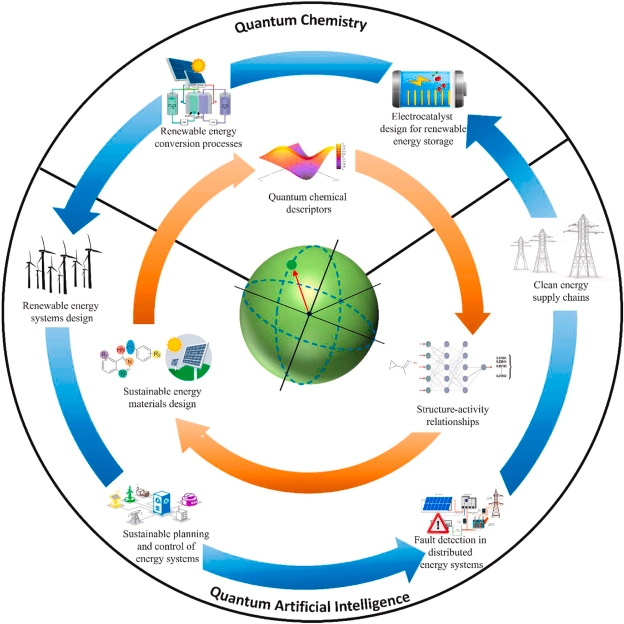Quantum Computing Sustainable Practices
In our ever-evolving world, pursuing sustainable practices has become a paramount concern. Innovative solutions are imperative as we grapple with the challenges posed by climate change, resource depletion, and environmental degradation. One such solution that holds immense potential is quantum computing. This cutting-edge technology promises to revolutionize various industries, including those focused on sustainability.
Table of Contents
Understanding the Potential of Quantum Computing in Driving Sustainable Practices

The power of quantum computing lies in its ability to simulate and optimize complex systems, which is essential for addressing sustainability challenges. Traditional computing methods often need help to handle the vast number of variables and intricate interactions involved in these systems. However, quantum computers can efficiently model and analyze these complexities, providing insights for sustainable decision-making.
Real-World Examples of Using Quantum Computing for Sustainability

The applications of quantum computing in driving sustainable practices are diverse and far-reaching. Here are some real-world examples that illustrate the potential of this technology:
- Optimizing renewable energy systems: Quantum algorithms can be employed to optimize the design and operation of renewable energy systems, such as wind farms and solar arrays. By analyzing complex weather patterns, topographical data, and energy demand profiles, quantum computers can identify the most efficient configurations, maximizing energy production while minimizing environmental impact.
- Developing energy-efficient materials: Quantum simulations can aid in discovering and developing new materials with enhanced energy-efficient properties. These materials could be used in various applications, such as building insulation, energy storage, and transportation, contributing to reduced energy consumption and carbon emissions.
- Improving supply chain logistics: Supply chain optimization is a complex problem involving numerous variables, such as transportation routes, inventory levels, and resource allocation. Quantum computers can analyze these variables more efficiently, leading to optimized supply chains that minimize waste, reduce carbon footprints, and promote sustainable practices.
- Modeling climate patterns: Climate modeling is a computationally intensive task that requires processing vast amounts of data and simulating intricate atmospheric and oceanic interactions. Quantum computers can significantly improve the accuracy and resolution of these models, providing valuable insights into climate change patterns and enabling more effective mitigation strategies.
The Benefits and Challenges of Implementing Quantum Computing for Sustainable Practices

The integration of quantum computing into sustainable practices offers numerous benefits:
- Increased efficiency: Quantum computers can process vast amounts of data and solve complex problems more efficiently than classical computers, leading to optimized solutions that maximize resource utilization and minimize waste.
- Enhanced decision-making: By providing accurate simulations and modeling capabilities, quantum computing enables informed decision-making processes, ensuring sustainable practices are based on reliable data and insights.
- Accelerated innovation: The computational power of quantum computing can accelerate the development of new technologies, materials, and processes that contribute to sustainability, driving innovation and fostering a more sustainable future.
However, Implementing Quantum Computing for Sustainable Practices also Presents Several Challenges:
- Technology maturity: Quantum computing is still an emerging field, and developing large-scale, fault-tolerant quantum computers remains a significant challenge. Overcoming technical hurdles and achieving practical scalability is crucial for widespread adoption.
- Data availability and quality: Quantum computing relies on high-quality data to produce accurate results. Ensuring the availability and integrity of relevant data sets, such as environmental data, energy consumption patterns, and material properties, can be a significant challenge.
- Skill and expertise gap: Developing and utilizing quantum computing applications requires specialized knowledge and expertise in quantum physics, computer science, and various domain-specific areas. Bridging this skill gap and fostering interdisciplinary collaboration is essential for successful implementation.
Quantum Computing and its Impact on Various Industries

The transformative potential of quantum computing extends beyond sustainability initiatives, with far-reaching implications across various industries. Here are some examples of how quantum computing can impact different sectors:
- Healthcare and pharmaceuticals: Quantum computing can revolutionize drug discovery and development processes by simulating complex molecular interactions and accelerating the identification of potential drug candidates. Additionally, it can enhance medical imaging techniques and enable personalized medicine through advanced data analysis.
- Finance and banking: Quantum algorithms can optimize portfolio management, risk analysis, and fraud detection in the finance industry. Quantum computing can also enhance cryptographic protocols, ensuring secure financial transactions and data protection.
- Transportation and logistics: Quantum computing can optimize transportation routes, scheduling, and resource allocation, leading to more efficient logistics operations and reduced carbon emissions. It can also contribute to developing advanced materials for lightweight and energy-efficient vehicles.
- Manufacturing and materials science: Quantum simulations can aid in the design and development of new materials with superior properties, such as increased strength, durability, and energy efficiency. This can lead to improved product design, reduced waste, and more sustainable manufacturing processes.
- Cybersecurity and cryptography: Quantum computing poses both challenges and opportunities in the realm of cybersecurity. While it has the potential to break specific encryption algorithms, it also enables the development of quantum-resistant cryptographic protocols, ensuring secure data transmission and storage.
Ethical Considerations and Concerns in Quantum Computing for Sustainability
While quantum computing holds immense potential for driving sustainable practices, addressing ethical considerations and concerns arising from its implementation is crucial. Some key ethical issues include:
- Privacy and data security: Quantum computing’s computational power poses potential data privacy and security risks. Robust measures must be implemented to protect sensitive data, such as environmental and energy-related information, from unauthorized access or misuse.
- Responsible use and governance: As with any transformative technology, the responsible use and governance of quantum computing are essential. Clear guidelines, regulations, and ethical frameworks must be established to ensure that quantum computing is utilized for the greater good and does not contribute to unsustainable practices or harmful applications.
- Accessibility and digital divide: The development and deployment of quantum computing technologies may exacerbate existing digital divides, with some regions or communities lacking access to these advanced technologies. Efforts must be made to ensure equitable access and prevent further marginalization of underserved populations.
- Environmental impact of quantum computing: While quantum computing can contribute to sustainable practices, the energy consumption and potential ecological effects of operating large-scale quantum computers must be carefully considered and mitigated.
- Transparency and public trust: Building public trust and fostering transparency in developing and using quantum computing for sustainability initiatives are crucial. Open communication, public engagement, and responsible disclosure of potential risks and benefits can help alleviate concerns and promote acceptance of this technology.
Related Post: Why Might Businesses Be Interested in Using Quantum Computers
Frequently Asked Questions (FAQs)
What is quantum computing, and how does it differ from classical computing?
Quantum computing is a revolutionary computing paradigm that harnesses the principles of quantum mechanics, such as superposition and entanglement, to perform calculations. Unlike classical computers, which process information in binary form (0s and 1s), quantum computers manipulate quantum bits (qubits) that can exist in multiple states simultaneously, enabling them to solve complex problems more efficiently.
How can quantum computing contribute to sustainable practices?
Quantum computing’s ability to simulate and optimize complex systems, process vast amounts of data, and solve intricate problems make it an invaluable tool for driving sustainable practices. It can be applied to optimize renewable energy systems, develop energy-efficient materials, improve supply chain logistics, model climate patterns, and tackle various other sustainability challenges.
What are some real-world examples of using quantum computing for sustainability?
Real-world examples include optimizing the design and operation of wind farms and solar arrays, developing new energy-efficient materials through quantum simulations, improving supply chain logistics to reduce waste and carbon footprints, and enhancing climate modeling for more accurate predictions and mitigation strategies.
What are the challenges of implementing quantum computing for sustainable practices?
Key challenges include the current maturity level of quantum computing technology, the availability and quality of relevant data sets, and the skill and expertise gap in quantum computing and related domains. Overcoming these challenges through continued research, investment, and collaboration is crucial for successful implementation.
How can businesses leverage quantum computing for sustainable practices?
Companies can invest in quantum computing research and development, develop in-house expertise, explore partnerships and collaborations, implement solutions tailored to their sustainability challenges, and create a robust quantum computing ecosystem.
Conclusion
As we navigate the complex sustainability challenges, quantum computing emerges as a powerful tool that can revolutionize our approach to addressing these issues. By harnessing the unique properties of quantum mechanics, this transformative technology enables us to simulate, optimize, and analyze complex systems with unprecedented accuracy and efficiency.







